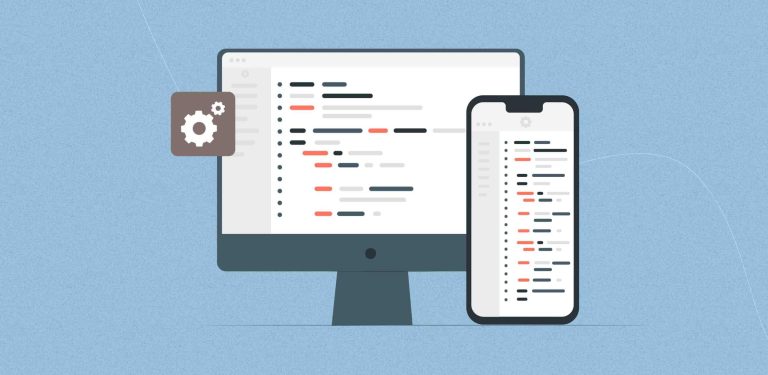

AI software development is a cornerstone of innovation across various industries in today’s digital era. As businesses and services evolve, integrating artificial intelligence into software systems has become not just advantageous but essential. This technology offers unprecedented capabilities, from automating routine tasks to providing deep insights into data that were previously unattainable. With its ability to adapt and learn, AI is revolutionizing the way we understand and interact with the digital world.
Here this article explores the realm of AI software development from its fundamental concepts to its practical applications, illustrating its pivotal role in shaping the future of technology and business.
Artificial Intelligence (AI) refers to the simulation of human intelligence in machines that are programmed to think and learn like humans. These intelligent systems are capable of performing tasks that typically require human cognition, such as visual perception, speech recognition, decision-making, and language translation. AI encompasses a wide range of technologies and methodologies, including machine learning, deep learning, natural language processing, and robotics.
At its core, AI aims to create systems that can perform tasks autonomously and improve their performance over time through learning and adaptation. Machine learning, a subset of AI, involves training algorithms on vast amounts of data to identify patterns and make predictions. Deep learning, a more advanced form of machine learning, uses neural networks with many layers (hence “deep”) to analyze complex data.
AI is categorized into two main types:
AI software development refers to the process of designing, building, and implementing software solutions powered by artificial intelligence. It involves the creation of algorithms that enable computers to perform tasks that typically require human intelligence. These tasks include learning, reasoning, problem-solving, perception, and understanding language. Beyond just programming, it encompasses a broad range of AI disciplines such as deep learning, neural networks, and machine learning models that interpret and process data at a transformative scale. This development process is integral to creating systems that can autonomously improve and adapt over time, making software smarter and more intuitive to user needs.
Artificial Intelligence (AI) continues to reshape the business landscape, driving unprecedented levels of innovation, efficiency, and competitiveness. In 2024, AI software development continues to revolutionize businesses by automating tasks, enhancing data analysis capabilities, and enabling personalized customer experiences. It empowers businesses with predictive analytics for strategic decision-making, improves cybersecurity measures, optimizes operations, and fosters innovation through new product development. AI remains essential for businesses seeking efficiency gains, competitive advantage, and enhanced customer satisfaction in a rapidly evolving market landscape.
AI software development is revolutionizing the business world in 2024, bringing about significant changes in how companies operate, make decisions, and engage with customers. The following are some of the key ways AI is transforming businesses:
Automation of Routine Tasks
AI-powered automation tools are taking over repetitive and mundane tasks, freeing up human resources for more strategic and creative work. From automated data entry to intelligent customer service chatbots, AI is streamlining operations and enhancing productivity.
Data-Driven Decision Making
AI algorithms analyze vast amounts of data to provide actionable insights. Businesses can make more informed decisions based on data-driven predictions and trends. This shift towards data-centric decision-making helps companies stay ahead of the competition and adapt to market changes swiftly.
Enhanced Customer Experiences
AI technologies are enabling businesses to offer personalized and seamless customer experiences. AI-driven personalization engines tailor recommendations and interactions based on individual preferences and behaviors. This personalization boosts customer satisfaction and loyalty.
Predictive Analytics and Forecasting
Predictive analytics powered by AI helps businesses forecast future trends and demand with greater accuracy. Whether it’s predicting inventory needs or anticipating customer behavior, AI-driven forecasts enable proactive planning and resource allocation.
Improved Operational Efficiency
AI optimizes business processes by identifying inefficiencies and suggesting improvements. In manufacturing, AI-powered predictive maintenance minimizes downtime and extends equipment life. In supply chain management, AI algorithms optimize logistics and reduce costs.
Innovation and New Business Models
AI fosters innovation by enabling the development of new products, services, and business models. Companies are leveraging AI to create intelligent products that offer superior functionality and user experiences. Additionally, AI is driving the evolution of entirely new business models, such as AI-as-a-Service.
AI software development offers a transformative potential for businesses across all sectors, providing them with the tools to revolutionize their operations and achieve significant competitive advantages. Here are some of the key benefits that AI software development brings to the table:
Increased Productivity
AI technologies excel at automating routine, repetitive tasks, which allows human employees to focus on higher-value activities that require creativity, strategic thinking, and human touch. For example, AI-powered tools can handle data entry, appointment scheduling, and basic customer inquiries, freeing up employees to work on complex problem-solving and innovation. This automation not only boosts productivity but also enhances operational efficiency by minimizing errors and speeding up processes.
Enhanced Customer Insights
AI systems analyze vast amounts of customer data to uncover deep insights into customer preferences, behaviors, and needs. By processing data from various sources such as social media, purchase history, and online interactions, AI can identify patterns and trends that would be challenging for humans to detect. Businesses can leverage these insights to tailor their products, services, and marketing strategies to meet customer demands more effectively. For instance, AI-driven recommendation engines on e-commerce platforms suggest products that customers are more likely to purchase, thereby enhancing customer satisfaction and loyalty.
Cost Savings
AI-driven automation and optimization significantly reduce operational costs. For instance, predictive maintenance powered by AI helps in anticipating equipment failures before they occur, thereby reducing downtime and maintenance costs. AI can also optimize supply chain operations by predicting demand and managing inventory levels, leading to cost savings in storage and logistics. Additionally, AI chatbots can handle multiple customer inquiries simultaneously, reducing the need for large customer support teams and lowering labor costs.
Better Decision Making
AI software development provides businesses with data-driven insights that enhance decision-making processes. By analyzing large datasets quickly and accurately, AI can identify trends, correlations, and anomalies that inform strategic decisions. Predictive analytics tools powered by AI help businesses forecast future trends, enabling proactive planning and risk management. Real-time data analysis ensures that businesses make timely and informed decisions, which is crucial in fast-paced industries like finance, retail, and technology.
Competitive Advantage
Early adopters of AI technologies gain a significant competitive edge by leveraging advanced tools to innovate and improve their offerings. AI helps businesses stay ahead in a rapidly evolving market by enabling faster response to changes, personalized customer experiences, and efficient operations. Companies that integrate AI into their business models can develop new products and services that set them apart from competitors. For example, AI-driven financial services can offer personalized investment advice, while AI-powered healthcare solutions can provide more accurate diagnostics and treatment recommendations.
Scalability is essential in AI software development, ensuring that solutions can grow seamlessly with the business. Scalable AI services allow organizations to manage increased workloads without losing performance or compromising on service delivery. This means developing AI systems that can handle a growing amount of work by either enlarging or enhancing the resources available. Such scalability is crucial for businesses expecting data growth, user base expansion, or those needing to adapt to changing market demands. Effective scalable AI solutions ensure that as the business scales, the AI solutions continue to provide real-time responses and maintain high levels of accuracy without the need for constant redesign or significant additional investments.
AI consulting services help businesses understand potential AI strategies, align AI technologies with business goals, and implement effective AI solutions. Consultants assess the current state of your technology, determine the feasibility of AI integration, and plan a roadmap that aligns with your strategic objectives. This includes identifying the right AI opportunities, choosing technologies, and designing frameworks that support scalable and efficient AI deployments. The goal is to provide expert guidance that maximizes ROI from AI investments while mitigating risks associated with AI projects.
Dedicated AI software development focuses on creating bespoke solutions tailored to specific business needs, utilizing advanced AI algorithms and techniques. This process involves not only coding and developing software but also ensuring that the AI is deeply integrated into the company’s operations. Custom AI software solutions are designed to solve particular problems, improve efficiencies, or enable new functionalities that are not possible with off-the-shelf software, providing a competitive edge to businesses.
Generative AI Software Development
Generative AI opens new possibilities for content creation, design, and media production, allowing companies to innovate and produce at unprecedented scales. This branch of AI involves algorithms that can generate text, images, videos, and audio files that are indistinguishable from human-created content. Such capabilities enable businesses to automate creative processes, enhance product designs, and deliver personalized content to users, significantly reducing time and cost while increasing creativity and throughput.
Read the blog on Unlocking the Potential of Generative AI Development: A Comprehensive Guide.
Conversational AI Software Development
Conversational AI, including chatbots and virtual assistants, transforms customer service, offering 24/7 support and automating interaction. These AI systems are designed to understand and respond to user queries in a natural, human-like manner, providing immediate assistance and resolving issues without human intervention. They can be integrated into websites, apps, and messaging platforms, offering a consistent and scalable way to improve customer experience and engagement.
Integrating technologies like ChatGPT can enhance user interaction, provide tailored customer support, and streamline communication processes. ChatGPT can understand and generate human-like text based on the input it receives, making it an invaluable tool for enhancing interaction with customers, automating responses, and even managing more complex tasks such as generating reports or drafting emails. Integration of such models into business operations can significantly reduce workload and improve efficiency.
Video analytics powered by AI can process and analyze video content in real-time to provide insights and enhance security protocols. This technology applies AI algorithms to video streams to detect patterns, recognize faces, and monitor anomalies, making it essential for security, surveillance, and operational efficiency. The insights gained can help prevent theft, understand customer behavior, manage traffic flows, and more, thereby adding significant value to the operational intelligence of a business.
Large Language Model Development
Developing large language models helps in understanding and generating human-like text, enabling businesses to improve communication and content generation. These models are trained on vast datasets to grasp the nuances of language, making them capable of performing tasks ranging from translating languages to generating informative, engaging content automatically. Businesses leverage these models to enhance customer service, automate content creation, and even drive research and development.
Enterprise AI Software Development
Enterprise AI solutions can automate and optimize business processes, enhance data analysis, and drive strategic decision-making. These systems are integrated at a larger scale within the company’s infrastructure, providing automated insights that help refine strategies, optimize operations, and make informed decisions quickly. Enterprise AI can lead to significant improvements in efficiency, productivity, and profitability.
Building a team of skilled AI developers is crucial for businesses looking to innovate and maintain competitive advantages in their industries. These developers are not just coders; they are architects of the future business landscape, equipped with the skills to build complex AI systems that can learn and adapt. Investing in top talent ensures that the business remains at the cutting edge of technology, ready to implement powerful AI solutions that drive growth and innovation.
Despite its numerous benefits, implementing AI comes with several challenges that businesses must navigate to achieve successful deployment and integration. Here are some of the key challenges:
Data Quality and Availability
AI systems rely on high-quality data to function effectively. Many businesses struggle with data quality issues, such as incomplete, inconsistent, or biased data. These issues can significantly hinder the performance of AI models. Ensuring data accuracy and availability is critical for successful AI implementation. This involves comprehensive data collection, cleaning, and management processes to provide the AI systems with reliable and relevant data for analysis.
Skill Gap
Implementing AI requires specialized skills in data science, machine learning, and AI software development. Many businesses face a shortage of skilled professionals who can design, develop, and maintain AI systems. This skill gap presents a significant barrier to AI adoption, as the complexity of AI technologies demands a deep understanding of algorithms, data handling, and model optimization. To bridge this gap, businesses may need to invest in training programs, hire expert consultants, or collaborate with academic institutions to build the necessary expertise.
Integration with Existing Systems
Integrating AI software solutions with existing IT infrastructure can be complex and costly. Businesses need to ensure that AI systems can seamlessly interact with legacy systems and data sources. This integration challenge involves ensuring compatibility between new AI technologies and the current systems in use. It often requires significant modifications to existing processes and systems, as well as the development of new interfaces and protocols to facilitate smooth data exchange and operation.
Ethical and Regulatory Concerns
AI software development raises ethical and regulatory issues, such as data privacy, bias, and transparency. Businesses must navigate these concerns to ensure compliance with laws and regulations while maintaining ethical standards. The ethical implications of AI include ensuring that AI systems do not perpetuate or amplify biases present in the training data. Additionally, transparency in AI decision-making processes is essential to build trust with stakeholders. Regulatory compliance is another critical aspect, as businesses must adhere to data protection laws and guidelines to avoid legal repercussions and maintain their reputation.
High Implementation Costs
Developing and deploying AI software solutions can be expensive, especially for small and medium-sized enterprises (SMEs). The high costs of AI implementation can be a barrier to adoption for many businesses. These costs include expenses related to acquiring advanced hardware and software, hiring skilled personnel, and ongoing maintenance and updates of AI systems. Additionally, businesses may need to invest in extensive training for their staff to effectively use and manage AI technologies. While AI offers significant long-term benefits, the initial financial investment can be substantial, making it challenging for some organizations to adopt AI solutions fully.
As AI continues to evolve, several trends and predictions are shaping its future impact on businesses. The following key trends are expected to drive the adoption and transformation of AI across various industries in 2024:
Increased Adoption of AI in SMEs
AI technologies are becoming more accessible and affordable, leading to increased adoption among Small and Medium-sized Enterprises (SMEs). This democratization of AI allows smaller businesses to leverage advanced technologies for growth and innovation. With the proliferation of user-friendly AI tools and platforms, SMEs can now integrate AI into their operations without the need for extensive technical expertise or large budgets. AI-powered solutions such as customer service chatbots, predictive analytics, and marketing automation are helping SMEs compete with larger enterprises by improving efficiency, enhancing customer experiences, and driving revenue growth.
AI-Driven Automation of Complex Tasks
Beyond routine tasks, AI is advancing to automate more complex and cognitive tasks. This includes areas like legal research, financial analysis, and medical diagnostics, where AI can provide expert-level insights and recommendations. For instance, AI algorithms can analyze vast amounts of legal documents to identify relevant precedents, saving time and reducing costs for legal firms. In finance, AI-driven tools can perform detailed financial analysis, detect anomalies, and predict market trends with high accuracy. In healthcare, AI-powered diagnostic tools can assist doctors in identifying diseases from medical images and patient data, leading to faster and more accurate diagnoses. The automation of these complex tasks not only enhances productivity but also improves the quality and consistency of outcomes.
Growth of AI-as-a-Service
The AI-as-a-Service (AIaaS) market is expanding, allowing businesses to access AI capabilities without significant upfront investments. Cloud-based AI services provide scalable and flexible solutions for various business needs. Companies like Amazon Web Services (AWS), Microsoft Azure, and Google Cloud offer AIaaS platforms that include machine learning models, natural language processing, computer vision, and more. These services enable businesses to integrate AI into their operations quickly and cost-effectively, without the need for in-house AI expertise. The growth of AIaaS is driving innovation across industries by making advanced AI technologies accessible to a broader range of organizations, from startups to large enterprises.
Enhanced AI Ethics and Governance
With growing concerns about AI ethics and governance, businesses are adopting frameworks to ensure responsible AI use. This includes addressing bias, ensuring transparency, and complying with regulatory standards. AI models can inadvertently perpetuate biases present in the data they are trained on, leading to unfair and discriminatory outcomes. To mitigate this, companies are implementing measures such as bias detection and correction, explainable AI (XAI), and robust data governance practices. Regulatory bodies are also stepping in to establish guidelines and standards for AI ethics, emphasizing the importance of transparency, accountability, and fairness in AI systems. By prioritizing ethical considerations, businesses can build trust with customers, regulators, and other stakeholders.
Integration of AI with Emerging Technologies
AI is increasingly being integrated with other emerging technologies, such as the Internet of Things (IoT), blockchain, and 5G. These integrations enable new use cases and applications, driving further innovation. For example, AI and IoT combined can create intelligent and connected environments, where AI algorithms analyze data from IoT sensors to optimize operations, enhance security, and improve decision-making. In supply chain management, blockchain can be used to create transparent and secure records of transactions, while AI analyzes this data to predict demand, manage inventory, and detect fraud. The rollout of 5G networks provides the high-speed connectivity needed for real-time AI applications, such as autonomous vehicles and smart cities. The convergence of AI with these technologies is opening up new possibilities for businesses to innovate and transform their operations.
Focus on Explainable AI
Explainable AI (XAI) is gaining traction as businesses seek to understand and trust AI decisions. XAI provides transparency into how AI models make decisions, enhancing trust and accountability. Traditional AI models, particularly deep learning algorithms, are often considered “black boxes” because their decision-making processes are not easily interpretable. This lack of transparency can be a barrier to adoption, especially in regulated industries like healthcare and finance. XAI addresses this challenge by providing insights into the factors and processes that influence AI decisions. Techniques such as feature importance, model visualization, and surrogate models help stakeholders understand and validate AI outputs. By making AI more interpretable and trustworthy, XAI facilitates wider acceptance and responsible use of AI technologies.
Artificial Intelligence (AI) is driving innovation and efficiency across multiple industries, transforming the way businesses operate and deliver value. In this section, we explore how AI is revolutionizing specific sectors such as healthcare, finance, retail, manufacturing, and education. By examining industry-specific use cases, we highlight the practical applications of AI and the benefits it brings to each field. Discover how AI is shaping the future of these industries and why it is an essential technology for modern businesses.
AI Software Development for Healthcare
AI software solutions are transforming medical imaging and diagnostics by enabling faster and more accurate analysis of medical images. Machine learning algorithms can detect patterns and anomalies in X-rays, MRIs, and CT scans with high precision, often surpassing human capabilities. AI tools assist radiologists in identifying conditions such as tumors, fractures, and other abnormalities early, leading to more timely and effective treatments. This revolution in medical imaging reduces diagnostic errors and improves patient outcomes.
Predictive analytics can significantly enhance patient care by leveraging data to forecast potential health issues before they become critical. By analyzing historical health data and identifying trends, AI systems can predict disease outbreaks, patient readmissions, and potential complications. This proactive approach allows healthcare providers to implement preventative measures, personalize treatment plans, and allocate resources more efficiently, ultimately improving patient care and reducing healthcare costs.
AI software plays a pivotal role in robotic surgery by providing precision, consistency, and enhanced control. AI-powered surgical robots assist surgeons in performing complex procedures with greater accuracy through real-time data analysis and advanced imaging. These robots can make precise movements and access hard-to-reach areas, reducing the risk of human error. The integration of AI in robotic surgery leads to minimally invasive procedures, shorter recovery times, and better patient outcomes.
AI Software Development for Finance
AI software solutions help in fraud detection and prevention by continuously monitoring and analyzing large volumes of transactions in real time. Machine learning algorithms can identify suspicious patterns and behaviors indicative of fraudulent activity. By flagging anomalies and potential fraud cases, AI software enables financial institutions to respond quickly and mitigate risks. AI-driven fraud detection systems adapt to new fraud techniques, making them more effective over time in protecting financial assets and customer information.
Automated trading systems, also known as algorithmic trading, use AI and machine learning to execute trades based on pre-set criteria and market conditions. These systems analyze market data, identify trading opportunities, and execute trades at optimal times without human intervention. By leveraging AI, automated trading systems can process vast amounts of data at high speed, react to market changes in real time, and improve trading efficiency and profitability.
AI enhances customer service in finance by providing personalized and efficient support through chatbots and virtual assistants. These AI-powered tools can handle routine inquiries, process transactions, and offer financial advice 24/7. By analyzing customer data, AI can tailor recommendations and solutions to individual needs, improving customer satisfaction and engagement. AI also helps financial institutions streamline their operations and reduce response times, leading to better overall service quality.
AI Software Development for Retail
AI can provide personalized shopping experiences by analyzing customer data, such as purchase history and browsing behavior, to recommend products and offers tailored to individual preferences. AI algorithms can create highly personalized marketing campaigns, enhancing customer engagement and loyalty. By understanding customer preferences, AI helps retailers deliver a more enjoyable and relevant shopping experience, both online and in-store.
AI optimizes inventory management and supply chain operations by predicting demand, automating replenishment processes, and identifying inefficiencies. Machine learning models analyze sales data, market trends, and external factors to forecast inventory needs accurately. AI systems can automate order placements, track shipments, and manage warehouse operations in real time. This optimization reduces stockouts, minimizes excess inventory, and enhances supply chain efficiency, ultimately lowering costs and improving customer satisfaction.
AI-powered chatbots and virtual assistants offer numerous benefits in retail, including enhanced customer support, increased sales, and operational efficiency. These tools can handle a wide range of customer inquiries, provide product recommendations, process orders, and resolve issues quickly. By offering 24/7 support, AI chatbots improve customer satisfaction and engagement. Additionally, they free up human staff to focus on more complex tasks, contributing to overall productivity and cost savings.
AI Software Development for Manufacturing
Predictive maintenance benefits manufacturing by using AI to monitor equipment health and predict failures before they occur. By analyzing data from sensors and historical maintenance records, AI systems can identify signs of wear and tear, enabling timely interventions. This proactive approach minimizes downtime, extends equipment lifespan, and reduces maintenance costs. Predictive maintenance ensures smoother operations and higher productivity in manufacturing processes.
AI can significantly improve quality control and defect detection in manufacturing. Machine learning algorithms analyze data from production lines to identify defects and inconsistencies in real time. AI-powered visual inspection systems can detect minute flaws that might be missed by human inspectors. By ensuring high-quality standards and reducing the incidence of defective products, AI enhances product reliability and customer satisfaction.
AI plays a crucial role in product design and development by accelerating the innovation process and optimizing design choices. AI tools can analyze market trends, customer feedback, and historical data to suggest new product features and improvements. Machine learning models simulate different design scenarios and predict their performance, helping engineers make informed decisions. By streamlining the design process and reducing time-to-market, AI contributes to more innovative and competitive products.
AI Software Development for Education
AI creates personalized learning experiences by adapting educational content to meet individual student needs. AI-powered platforms analyze student performance data to identify strengths and weaknesses, tailoring lessons and assessments accordingly. This personalized approach helps students learn at their own pace, improving engagement and academic outcomes. AI also provides real-time feedback and support, enhancing the overall learning experience.
AI can streamline administrative tasks in education by automating processes such as admissions, scheduling, and grading. AI systems can manage student records, process applications, and generate reports with high efficiency and accuracy. By reducing the administrative burden on educators and staff, AI allows them to focus more on teaching and student support, improving the overall effectiveness of educational institutions.
AI contributes to content creation and curation by generating educational materials and organizing resources based on relevance and quality. AI tools can create quizzes, assignments, and interactive lessons tailored to specific learning objectives. Additionally, AI-powered recommendation systems suggest supplementary resources, such as articles and videos, that align with students’ interests and curriculum requirements. This enhances the quality and accessibility of educational content.
Know more about AI in Education: Transforming the Education Industry with AI-Powered E-Learning App Development
AI Software Development for Banking
AI improves risk management in banking by analyzing large datasets to identify potential risks and predict future trends. Machine learning algorithms can detect early warning signs of financial distress, enabling banks to take proactive measures. AI systems can also assess credit risk more accurately by considering a wider range of factors than traditional methods. This leads to better decision-making and reduces the likelihood of financial losses.
AI enhances customer experience in banking by providing personalized and efficient services. AI-powered chatbots and virtual assistants can handle routine inquiries, process transactions, and provide financial advice 24/7. By analyzing customer data, AI can tailor product recommendations and services to individual needs, improving customer satisfaction and loyalty. AI also streamlines back-office operations, reducing wait times and improving overall service quality.
AI plays a crucial role in fraud detection and prevention by continuously monitoring and analyzing large volumes of transactions in real time. Machine learning algorithms can identify suspicious patterns and behaviors indicative of fraudulent activity. By flagging anomalies and potential fraud cases, AI enables banks to respond quickly and mitigate risks. AI-driven fraud detection systems adapt to new fraud techniques, making them more effective over time in protecting financial assets and customer information.
AI Software Development for Hospitality
AI is transforming guest services in hospitality by providing personalized and efficient experiences. AI-powered chatbots and virtual assistants can handle guest inquiries, process bookings, and provide recommendations 24/7. AI systems can also analyze guest preferences and behavior to offer personalized services, such as customized room settings and tailored dining experiences. This enhances guest satisfaction and loyalty, leading to better business outcomes.
AI can optimize hotel operations and resource management by analyzing data to predict demand and allocate resources efficiently. AI systems can forecast occupancy rates, optimize pricing strategies, and manage inventory in real time. This leads to better resource utilization, reduced costs, and improved profitability. AI also streamlines housekeeping and maintenance operations by predicting when rooms need cleaning or repairs, ensuring a seamless guest experience.
AI benefits marketing and customer engagement in hospitality by enabling personalized and targeted campaigns. By analyzing guest data, AI can segment customers and tailor marketing messages to individual preferences. AI-powered recommendation engines can suggest relevant offers and promotions, enhancing engagement and conversion rates. AI also helps in tracking and analyzing campaign performance, providing insights to optimize marketing strategies and improve ROI.
AI Software Development for Travel & Tourism
AI enhances travel planning and booking by providing personalized and efficient services. AI-powered chatbots and virtual assistants can handle inquiries, provide travel recommendations, and process bookings 24/7. AI systems can also analyze traveler preferences and behavior to offer personalized itineraries and suggestions, improving the overall travel experience. This leads to increased customer satisfaction and loyalty.
AI can improve operational efficiency in the travel industry by optimizing resource allocation and streamlining processes. AI systems can analyze data to forecast demand, optimize pricing strategies, and manage inventory in real time. This leads to better resource utilization, reduced costs, and improved profitability. AI also helps in managing logistics, such as flight schedules and hotel bookings, ensuring a smooth and seamless travel experience.
AI plays a crucial role in customer service and support in the travel industry by providing personalized and efficient services. AI-powered chatbots and virtual assistants can handle routine inquiries, process bookings, and provide travel advice 24/7. By analyzing customer data, AI can tailor recommendations and solutions to individual needs, improving customer satisfaction and engagement. AI also helps in managing and resolving customer issues quickly, leading to better overall service quality.
AI Software Development for Media & Entertainment
AI is transforming content creation and distribution in the media and entertainment industry by automating processes and personalizing experiences. AI-powered tools can generate content, such as articles, videos, and music, based on user preferences and trends. AI systems can also analyze viewer behavior to recommend relevant content, enhancing engagement and retention. This leads to more efficient content production and distribution, as well as improved audience satisfaction.
AI can enhance audience targeting and advertising by analyzing data to segment audiences and tailor campaigns. AI systems can identify patterns and trends in viewer behavior, enabling personalized and targeted advertising. This leads to higher engagement and conversion rates, as well as better ROI. AI also helps in optimizing ad placements and measuring campaign performance, providing insights to improve strategies and achieve business goals.
AI benefits content moderation and copyright protection by automating the detection and removal of inappropriate or unauthorized content. AI-powered tools can analyze images, videos, and text to identify and flag content that violates guidelines or infringes on copyrights. This leads to faster and more accurate moderation, ensuring a safe and compliant platform for users. AI also helps in protecting intellectual property by detecting and preventing content piracy, safeguarding the rights of creators and owners.
AI Software Development for Staffing & Recruitment
AI improves the recruitment process by automating tasks such as resume screening, candidate matching, and interview scheduling. AI-powered tools can analyze resumes and job descriptions to identify the best candidates for a position, reducing the time and effort required for recruitment. AI systems can also conduct initial interviews through chatbots or video analysis, assessing candidates’ skills and fit for the role. This leads to a more efficient and effective recruitment process, ensuring the best talent is hired.
AI can enhance employee engagement and retention by analyzing data to identify factors that influence job satisfaction and performance. AI-powered tools can monitor employee behavior, feedback, and performance metrics to provide insights and recommendations for improving engagement and retention. AI systems can also personalize training and development programs, ensuring employees have the skills and support they need to succeed. This leads to higher job satisfaction, reduced turnover, and better business outcomes.
AI plays a crucial role in workforce planning and management by analyzing data to forecast demand and allocate resources efficiently. AI systems can predict staffing needs based on historical data and trends, ensuring the right number of employees are available when needed. AI can also optimize scheduling, shift planning, and workload distribution, improving efficiency and productivity. This leads to better resource utilization, reduced costs, and a more agile and responsive workforce.
AI Software Development for OEMs (Original Equipment Manufacturers)
AI improves the production process for OEMs by optimizing operations and reducing inefficiencies. AI-powered systems can analyze production data to identify bottlenecks and areas for improvement, enabling more efficient and streamlined processes. AI can also predict equipment failures and maintenance needs, reducing downtime and extending equipment lifespan. This leads to higher productivity, lower costs, and improved product quality.
AI can enhance supply chain management for OEMs by providing real-time insights and optimizing resource allocation. AI systems can analyze data to forecast demand, manage inventory, and optimize logistics. This leads to better coordination and collaboration across the supply chain, reducing costs and improving efficiency. AI also helps in identifying and mitigating risks, ensuring a more resilient and agile supply chain.
AI benefits product design and development for OEMs by accelerating innovation and optimizing design choices. AI-powered tools can analyze market trends, customer feedback, and historical data to suggest new product features and improvements. Machine learning models can simulate different design scenarios and predict their performance, helping engineers make informed decisions. This leads to more innovative and competitive products, as well as reduced time-to-market.
AI Software Development for Automobiles
AI is revolutionizing autonomous driving by enabling vehicles to perceive and navigate their environment safely and efficiently. AI-powered systems can analyze data from sensors, cameras, and radar to detect and respond to obstacles, traffic, and road conditions. Machine learning algorithms can also predict the behavior of other vehicles and pedestrians, enabling more accurate and reliable decision-making. This leads to safer and more efficient autonomous vehicles, reducing the risk of accidents and improving transportation.
AI can improve vehicle maintenance and diagnostics by predicting issues before they become critical. AI-powered systems can analyze data from sensors and historical maintenance records to identify signs of wear and tear, enabling timely interventions. This proactive approach minimizes downtime, extends vehicle lifespan, and reduces maintenance costs. AI also helps in diagnosing problems more accurately, ensuring the right repairs are made quickly and efficiently.
AI plays a crucial role in enhancing the in-car experience by providing personalized and intuitive features. AI-powered systems can analyze driver behavior and preferences to adjust settings such as seat position, climate control, and entertainment options. Voice-activated assistants can also handle tasks such as navigation, phone calls, and media playback, providing a more convenient and enjoyable driving experience. AI also helps in improving safety features, such as driver monitoring and collision avoidance, ensuring a safer and more comfortable journey.
Read more on AI Everywhere: How Different Industries Benefit from Artificial Intelligence.
A robust AI software development solution involves a multi-step process that requires careful planning, the right tools, and a thorough understanding of the problem at hand. In this section, we will outline the key steps involved in developing an AI solution, from identifying the problem to deploying and monitoring the final product.
Identifying the Problem or Opportunity
The first step in AI software development is to clearly define the problem you are trying to solve or the opportunity you wish to capitalize on. This involves understanding the business context, setting clear objectives, and determining the scope of the AI project. A well-defined problem statement will guide the entire development process and ensure that the AI solution aligns with your business goals.
Gathering and Preparing Data
Data is the foundation of any AI solution. The quality and quantity of data significantly impact the performance of your AI models. The process of gathering and preparing data includes:
Tools:
Choosing the right AI technology and tools
Selecting the appropriate AI technologies and tools is crucial for the success of your project. The choice depends on the nature of the problem, the type of data, and the specific requirements of the solution.
Tools:
Building and training the AI model
Once the data is ready and the tools are selected, the next step is to build and train the AI model. This involves:
Tools:
Testing and validating the solution
After training the model, it is essential to test and validate it to ensure it performs well on unseen data. This involves:
Tools:
Deploying and monitoring the AI solution
The final step is to deploy the AI model into production and continuously monitor its performance. This ensures the model remains accurate and effective over time.
Tools:
Developing AI solutions requires a structured approach to ensure effectiveness, reliability, and ethical integrity. Here are some best practices for AI software development that can help businesses harness the full potential of AI technologies while maintaining ethical standards and ensuring continuous improvement.
How Can Collaboration Between Data Scientists and Domain Experts Improve AI Solutions?
Collaboration between data scientists and domain experts is crucial for the successful development of AI solutions. Here’s why:
Ensuring data privacy and security is paramount in AI development due to the sensitive nature of the data involved. Here’s why it’s critical:
Tools for Data Privacy and Security:
Ethical considerations in AI software development are essential to ensure that AI systems are fair, transparent, and unbiased. Key ethical considerations include:
Tools for Ethical AI Development
How to ensure continuous learning and improvement of AI models?
Continuous learning and improvement are vital for maintaining the effectiveness and relevance of AI models. Here’s how businesses can achieve this:
Tools for Continuous Improvement:
Incorporate privacy considerations into the design and development of AI systems. This means embedding data protection principles into the AI model from the outset, rather than as an afterthought. Privacy by design ensures that AI solutions are inherently secure and compliant.
Conduct Impact Assessments
Data Protection Impact Assessments (DPIAs) are crucial for identifying and mitigating risks associated with data processing activities. These assessments help businesses understand the potential impact of their AI solutions on data privacy and take necessary steps to minimize risks.
Ensure Transparency and Accountability
Transparency in AI operations is essential for regulatory compliance. Businesses should provide clear information about how AI systems make decisions, what data is used, and how it is processed. Establishing accountability frameworks ensures that there is oversight and responsibility for compliance efforts.
Train and Educate Employees
Continuous training and education of employees on data protection regulations and best practices are vital. This ensures that everyone involved in AI development and deployment understands their roles and responsibilities in maintaining compliance.
Several tools and technologies can assist businesses in achieving and maintaining compliance with regulatory standards:
GDPR Compliance Tools
By leveraging these tools and adopting best practices, businesses can ensure their AI software solutions are compliant with relevant regulations, thereby safeguarding data privacy and building trust with their customers.
In the rapidly evolving landscape of artificial intelligence, businesses are increasingly looking to integrate AI software solutions into their existing IT infrastructure. This integration can enhance operational efficiency, provide deeper insights, and drive innovation. However, the process requires careful planning and the right tools to ensure a seamless and effective implementation. Here, we explore how businesses can integrate AI software solutions with their current IT infrastructure and the tools that facilitate this process.
Understanding AI Integration
AI integration involves embedding AI capabilities into existing business processes and systems. This integration allows businesses to leverage AI’s analytical and decision-making abilities to enhance their operations. Key areas of integration include data analysis, customer service, supply chain management, and predictive maintenance.
Assessing Current Infrastructure
Conduct a thorough assessment of the existing IT infrastructure to identify compatibility and potential integration points for AI solutions.
Defining Clear Objectives
Establish clear objectives for the AI integration, such as improving customer experience, optimizing operations, or gaining insights from data.
Choosing the Right AI Solutions
Select AI solutions that align with the business objectives and can be seamlessly integrated into the existing infrastructure.
Data Preparation and Management
Ensure that data is properly prepared and managed. This involves data cleaning, normalization, and integration from various sources to feed into AI models.
Utilizing API Management Tools:
Application Programming Interfaces (APIs) play a crucial role in AI integration. They allow different software applications to communicate with each other, facilitating the integration of AI capabilities into existing systems.
Implementing Middleware Solutions
Middleware solutions act as a bridge between AI applications and existing systems. They help manage data exchange, ensuring smooth and efficient communication between disparate systems.
Testing and Validation
Rigorously test the integrated system to ensure it meets performance and reliability standards. Validate AI models to confirm their accuracy and effectiveness.
Continuous Monitoring and Improvement
Continuously monitor the integrated system’s performance and make necessary adjustments. Implement feedback loops to refine AI models and improve their outcomes over time.
Effective AI integration requires specific tools that facilitate communication, data management, and system compatibility. Here are some essential tools:
API Management Tools
Middleware Solutions
In the competitive landscape of 2024, businesses must ensure that their AI investments yield tangible benefits. Measuring the return on investment (ROI) and the overall success of AI projects is crucial for sustaining innovation and maintaining a competitive edge. This section will guide you through the essential metrics and tools needed to evaluate the success of your AI implementations effectively.
AI and Data Governance: Ensuring Responsible AI Development
In the realm of AI software development, data governance plays a pivotal role. As businesses increasingly rely on AI to drive decision-making and optimize operations, the integrity, security, and ethical management of data become paramount. This section delves into the importance of data governance in AI projects and explores the tools that facilitate effective data management.
Importance of Data Governance in AI Projects
Data Quality and Integrity
Data is the lifeblood of AI models. Ensuring high-quality, accurate, and reliable data is crucial for the performance and accuracy of AI systems. Poor data quality can lead to biased, misleading, or incorrect AI outcomes, which can have significant implications for business decisions and customer trust.
Compliance and Legal Requirements
With regulations such as GDPR, CCPA, and HIPAA, businesses must ensure that their data practices comply with legal standards. Data governance frameworks help organizations adhere to these regulations by defining policies and procedures for data collection, storage, processing, and sharing.
Data Security and Privacy
Protecting sensitive data from breaches and unauthorized access is essential. Effective data governance establishes robust security protocols and access controls, ensuring that data privacy is maintained throughout the AI lifecycle. This not only protects against cyber threats but also builds customer confidence in the organization’s data handling practices.
Ethical AI Practices
Data governance is critical in addressing ethical concerns related to AI, such as bias, discrimination, and transparency. By implementing governance frameworks, organizations can ensure that their AI models are trained on diverse and representative datasets, reducing the risk of biased outcomes. Additionally, governance policies promote transparency in AI decision-making processes, making it easier to explain and justify AI-driven decisions.
Operational Efficiency
Structured data governance enhances operational efficiency by streamlining data management processes. Clear data governance policies reduce redundancy, improve data accessibility, and facilitate seamless data integration across different systems and departments. This leads to more efficient AI model development and deployment.
To implement robust data governance, businesses can leverage various tools designed to manage and oversee data throughout its lifecycle. Here are some essential tools for effective data governance in AI projects:
Data Catalogs
Data catalogs provide a centralized repository where all data assets are documented and indexed. They help organizations understand what data they have, where it resides, and how it can be accessed and used. Key features of data catalogs include:
Popular Data Catalog Tools
Data Lineage Tools
Data lineage tools track the movement and transformation of data across the organization. They provide a visual representation of data flow, helping organizations understand how data is sourced, transformed, and utilized. Key benefits of data lineage tools include:
Popular Data Lineage Tools
How to build and train an AI team
Building and training an effective AI team is crucial for the successful implementation of AI projects. Here’s a step-by-step guide on how to create and nurture a team that can bring your AI vision to reality:
Clearly outline the objectives and scope of your AI projects. Understanding what you aim to achieve with AI will help you determine the skills and expertise required for your team.
Hire the Right Talent
Foster a Collaborative Environment
Encourage open communication and collaboration among team members. Cross-functional teams that work together can solve complex problems more effectively. Use collaboration tools like Slack, Trello, or Asana to keep everyone on the same page and facilitate teamwork.
Invest in Continuous Learning
AI is a rapidly evolving field, so it’s essential to keep your team updated with the latest developments and technologies. Encourage continuous learning through:
Promote a Culture of Experimentation
Allow your team to experiment with different approaches and technologies. This can lead to innovative solutions and improvements in existing processes. Implement a fail-fast mentality, where failures are seen as learning opportunities rather than setbacks.
Provide the Necessary Tools and Resources
Equip your team with the right tools and technologies to perform their tasks efficiently. This includes access to high-performance computing resources, cloud platforms, and AI development tools.
Roles needed in an AI project
An effective AI project requires a diverse set of roles, each contributing unique skills and expertise. Here’s a breakdown of the key roles needed:
Data Scientists
What emerging AI technologies and innovations should businesses watch out for?
Artificial Intelligence (AI) is advancing rapidly, and businesses need to stay informed about the latest technologies and innovations to remain competitive. Here are some key AI advancements to watch out for:
Natural Language Processing (NLP) Enhancements
NLP technologies are becoming more sophisticated, enabling machines to understand and respond to human language with greater accuracy. Businesses can leverage advanced NLP for improved customer service, sentiment analysis, and automation of routine tasks.
Computer Vision
Innovations in computer vision are transforming industries like retail, healthcare, and manufacturing. Enhanced image and video analysis can lead to improved quality control, automated inventory management, and even better diagnostic tools in healthcare.
Reinforcement Learning
This type of machine learning focuses on how agents should take actions in an environment to maximize cumulative reward. Businesses can use reinforcement learning for optimization tasks, such as logistics, supply chain management, and personalized marketing strategies.
AI-driven Cybersecurity
As cyber threats become more sophisticated, AI is playing a crucial role in identifying and mitigating risks. Advanced AI algorithms can detect anomalies, predict potential threats, and respond to security breaches in real-time.
Edge AI
Processing AI algorithms on local devices (edge computing) rather than centralized cloud servers reduces latency and enhances data privacy. This is particularly useful in IoT applications, autonomous vehicles, and smart cities.
Generative AI
Technologies like Generative Adversarial Networks (GANs) are enabling the creation of new data from existing datasets. Businesses can use generative AI for content creation, product design, and even drug discovery.
Quantum Computing
While still in its infancy, quantum computing promises to revolutionize AI by solving complex problems that are currently beyond the capabilities of classical computers. Businesses should keep an eye on this emerging technology for future applications in optimization, cryptography, and materials science.
What are the long-term predictions for AI’s impact on industries?
The long-term impact of AI on various industries is profound and transformative. Here are some predictions:
Healthcare: AI will continue to revolutionize healthcare by enhancing diagnostic accuracy, personalizing treatment plans, and improving patient outcomes. Predictive analytics and AI-driven wearable devices will become commonplace.
Finance: AI will lead to more efficient and secure financial transactions, automated trading systems, and personalized financial advice. Fraud detection and risk management will be significantly enhanced through AI algorithms.
Retail: AI will enable hyper-personalized shopping experiences, optimize supply chain operations, and provide advanced customer service through AI-powered chatbots and virtual assistants.
Manufacturing: Smart factories powered by AI will optimize production processes, reduce downtime through predictive maintenance, and improve product quality. AI will also facilitate the development of new materials and products.
Education: AI will personalize learning experiences, automate administrative tasks, and provide intelligent tutoring systems. It will also assist in curriculum development and content creation.
Transportation and Logistics: Autonomous vehicles and AI-driven logistics systems will revolutionize transportation. AI will optimize routes, reduce delivery times, and improve safety.
Energy: AI will play a crucial role in managing and optimizing energy consumption, integrating renewable energy sources, and predicting equipment failures in power grids.
To thrive in an AI-driven future, businesses must take proactive steps to integrate AI into their operations and strategies. Here are some key steps to consider:
Invest in AI Talent
Building a team with expertise in AI, machine learning, and data science is crucial. Invest in training and development to ensure your workforce is equipped with the necessary skills.
Adopt a Data-first Approach
AI relies on high-quality data. Implement robust data governance practices, invest in data infrastructure, and ensure data privacy and security.
Collaborate with AI Experts
Partner with AI research institutions, technology providers, and startups to stay abreast of the latest developments and leverage external expertise.
Start Small with Pilot Projects
Begin with pilot projects to test AI applications in your business. This allows you to understand the technology’s potential and scalability before making significant investments.
Focus on ROI
Identify areas where AI can deliver the most value and ensure that projects are aligned with your business goals. Measure the return on investment (ROI) to justify further AI initiatives.
Stay Agile and Innovative
The AI landscape is constantly evolving. Foster a culture of innovation and agility within your organization to quickly adapt to new technologies and market changes.
Ethical AI Implementation
Ensure that your AI applications adhere to ethical standards. Address biases in AI models, maintain transparency, and consider the societal impact of your AI solutions.
Artificial Intelligence is no longer a futuristic concept; it’s a present-day reality transforming businesses across various industries. From healthcare to finance, retail to manufacturing, AI’s capabilities are enhancing operational efficiency, driving innovation, and providing competitive advantages. As we move further into 2024, the rapid advancements in AI technologies like natural language processing, computer vision, reinforcement learning, and edge computing continue to reshape the business landscape.
The journey of AI software development—from vision to reality—requires a strategic approach. Businesses must invest in AI talent, adopt a data-first mindset, and start with pilot projects to understand AI’s potential. By focusing on ROI, staying agile, and ensuring ethical implementation, organizations can prepare for an AI-driven future and unlock unprecedented opportunities for growth and success.
If you’re ready to take the next step in your AI journey, Enfin Technologies, a top AI software development company, is here to help. Our team of AI experts can assist you in developing custom AI software solutions tailored to your business needs. Contact us today to learn more about how we can help you leverage AI to drive innovation and achieve your business goals.
Do you have additional questions?
AI, or Artificial Intelligence, refers to the simulation of human intelligence processes by machines. Unlike traditional software development, which follows explicit programming rules, AI involves creating systems that can learn, reason, and adapt independently.
The main components of AI include machine learning, natural language processing (NLP), computer vision, and robotics. Each component addresses different aspects of human intelligence and capabilities.
AI can help businesses automate processes, improve decision-making, enhance customer experiences, increase efficiency, and drive innovation. It enables businesses to analyze large volumes of data quickly and accurately, leading to better insights and outcomes.
AI is transforming various industries, including healthcare, finance, retail, manufacturing, and education. Each industry benefits from AI through specific applications such as predictive analytics, personalized services, automation, and improved operational efficiency.
The key steps include problem identification, data collection and preparation, choosing the right AI technology and tools, model building and training, testing and validation, deployment and monitoring, and continuous improvement.
Common tools include programming languages like Python and R, frameworks such as TensorFlow, PyTorch, and Keras, and platforms like Jupyter Notebooks, Google Colab, and AWS SageMaker. Deployment and monitoring tools include Docker, Kubernetes, and Prometheus.
Ensuring quality involves rigorous testing and validation using tools like MLflow, TensorBoard, and Test.ai. It also includes continuous monitoring and updating of the model to adapt to new data and changing conditions.
Ethical considerations include ensuring data privacy and security, avoiding bias in AI models, and developing fair and transparent AI systems. Tools like AI Fairness 360 and Fairlearn can help address these issues.
Challenges include data quality and availability, integration with existing systems, lack of skilled AI professionals, high costs, and regulatory compliance. Overcoming these challenges requires strategic planning and collaboration between different stakeholders.
Success can be measured using metrics such as return on investment (ROI), accuracy and performance of AI models, customer satisfaction, and operational efficiency. Business Intelligence (BI) tools and performance analytics tools can help track and analyze these metrics

CSO - Pre-Sales & Marketing
CSO - Pre-Sales & Marketing

Enfin Technologies, with 15+ years of expertise in digital transformation, delivers AI-driven software solutions.
Austin, TX
Enfin Technologies Inc
5900 Balcones Drive # 13709
Austin, TX 78731, USA
Trivandrum, KL
Enfin Technologies India Pvt. Ltd.
C24, -2 Floor, Thejaswini Building,
Technopark Campus,
Trivandrum, Kerala, India – 695581
Bengaluru, KA
Enfin Technologies India Pvt. Ltd.
301/302, 3rd Floor, Saket Callipolis,
Sarjapur Main Road, Doddakannelli,
Bengaluru, Karnataka, India – 560035
Sales Enquiry
: +91 808 609 5030
General Enquiry
: +91 471 407 0044







Founder, Concierge Care Plus